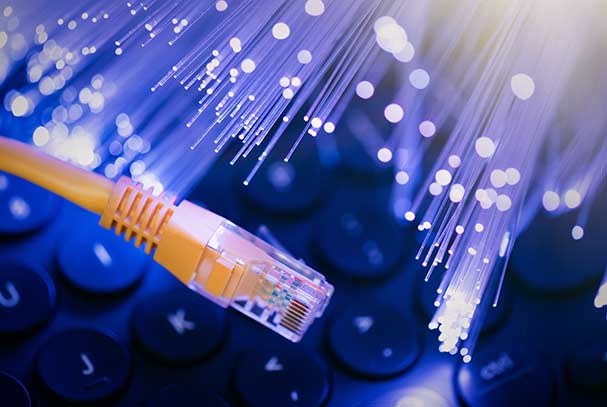In today’s digital age, reliable internet connectivity is the lifeblood of any small business. From seamless operations to delivering an exceptional customer experience, the type of internet connection you choose can significantly impact your success. But with options like cable internet and fiber optic internet on the market, how do you decide which is best for your business? Let’s explore the key differences and benefits of each to help you make an informed decision.
Understanding Cable Internet
How Cable Internet Works
Cable internet uses the same infrastructure as cable television, transmitting data through coaxial cables. These cables are widespread, making cable internet accessible in many locations. Essentially, a modem connects to the cable network, providing internet access to users.
Speed Capabilities of Cable Internet
Cable internet speeds can vary significantly depending on your provider and location. Generally, speeds range from 10 Mbps to 500 Mbps. While this is suitable for many small businesses, peak usage times can lead to slower speeds due to shared bandwidth.
Advantages and Disadvantages
One major advantage of cable internet is its availability and relatively lower cost compared to fiber optic. However, shared bandwidth can result in inconsistent speeds, especially during peak hours. Another downside is that cable is more susceptible to interference from electromagnetic sources, which can impact performance.
Decoding Fiber Optic Internet
Technical Breakdown of Fiber Optic Internet
Fiber optic internet employs light signals transmitted through thin strands of glass or plastic fibers, offering a more advanced and efficient means of data transfer. This technology allows for incredibly fast data transmission over long distances with minimal loss of signal quality.
Speed and Reliability Benefits
Fiber optic internet boasts speeds ranging from 100 Mbps to 1 Gbps or more, providing unparalleled performance. Unlike cable, fiber optic offers symmetrical speeds for both uploads and downloads, ensuring consistent performance. Additionally, fiber optic connections are less prone to interference, making them highly reliable.
Potential Drawbacks
While fiber optic internet is superior in terms of speed and reliability, it does come with higher upfront costs. Installation can be more complex and time-consuming, and availability may be limited in certain areas, particularly rural regions.
Speed, Reliability, and Cost Comparison
Speed Analysis
When it comes to speed, fiber optic internet outperforms cable internet by a significant margin. For businesses that rely on heavy data usage, such as e-commerce or video conferencing, fiber’s high-speed capabilities can be a game-changer. Real-world examples highlight how fiber can handle large data transfers without lag, maintaining productivity levels.
Reliability Considerations
Reliability is another critical factor. Fiber optic’s resistance to electromagnetic interference and its dedicated bandwidth ensure steady performance even during peak times. In contrast, cable internet’s shared bandwidth can lead to slowdowns, which may affect important business activities.
Cost Implications
Cost is always a consideration for small businesses. Cable internet generally offers a more budget-friendly option with lower monthly rates and installation costs. However, it’s important to weigh these savings against potential productivity losses due to slower speeds and less reliability. Fiber optic may have higher initial costs, but its long-term benefits could result in a better return on investment.
Best Fit for Small Businesses
Matching Needs with Solutions
For small businesses that require basic internet usage, such as email and web browsing, cable internet may suffice. However, for businesses involving large data transfers, cloud services, or heavy video conferencing, fiber optic is the better choice. E-commerce businesses, in particular, can benefit from fiber’s speed and reliability, ensuring smooth transactions and customer interactions.
Future-Proofing Your Business
Scalability and Innovation
Investing in the right internet service can future-proof your business. Fiber optic’s high-speed capabilities and reliability make it ideal for scaling operations. Whether expanding your team, adopting new technologies, or entering new markets, a robust internet connection ensures you’re not held back by connectivity issues.
Long-Term Benefits
Choosing fiber optic can also pave the way for innovative solutions like cloud computing, IoT devices, and advanced communication tools. These technologies can drive efficiency and competitiveness, positioning your business for long-term success.
Making the Decision
Assessing Your Needs
Begin by evaluating your current and future internet needs. Consider factors such as the size of your team, the nature of your business activities, and your growth plans. This assessment will help you determine the importance of speed, reliability, and cost.
Budget Considerations
While budget constraints are real, consider the potential productivity gains with a faster, more reliable internet connection. Analyze the total cost of ownership, including installation, monthly fees, and potential upgrades.
Informed Decision-Making
Gather quotes from various providers and compare their offerings. Look for customer reviews and testimonials to gauge service quality. Don’t hesitate to reach out to providers for clarifications and tailored solutions.
The Final Word from ADD Communications
In summary, the choice between cable internet and fiber optic internet hinges on your business’s specific needs and priorities. Cable internet offers a cost-effective solution for basic usage, while fiber optic provides superior speed and reliability for data-intensive operations. By carefully assessing your requirements and weighing the pros and cons, you can make an informed decision that supports your business’s growth and efficiency.
Ultimately, the right internet connection is more than just a utility; it’s a strategic investment. It impacts your ability to serve customers, collaborate with teams, and innovate for the future. Take the time to choose wisely, and your business will be well-equipped to thrive in the digital age.
At ADD Communications, we offer a range of fiber optic internet solutions tailored to small businesses. Our team of experts can help you assess your needs and find the perfect fit for your operations. Contact us today to learn more about our services and how we can support your business’s success.
